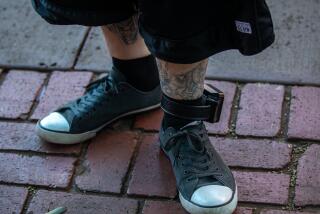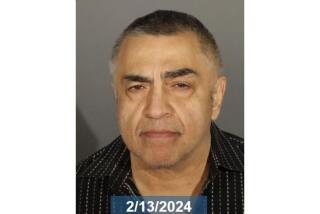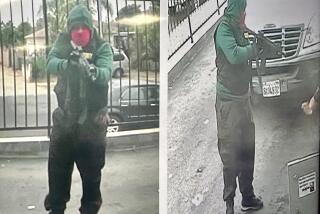Fugitive in Armored Truck Theft Surrenders : Crime: A man who allegedly stole $651,000 turns himself in on the theft’s anniversary just as letters said he would.
Exactly as he promised in two letters to a Delaware newspaper, a man wanted in the theft of $651,000 from an armored truck in Philadelphia two years ago surrendered to FBI agents at noon Saturday in front of the Los Angeles Chamber of Commerce offices in downtown Los Angeles.
Edward Leigh Hunt Jr. appeared suddenly in the street behind a mob of reporters and photographers crowded around the front door of the offices at 424 S. Bixel St.
Three FBI agents dashed from the front porch of the building, seized the 26-year-old fugitive--pale and shirtless, and silent under a barrage of reporters’ questions--and rushed him back toward the building.
Several bystanders applauded and shouted “Let him speak!” and “Free Leigh” as Hunt, looking somewhat stunned, was hustled through the crowd. Most said Hunt did not respond, but one man said he heard the fugitive mutter “America is a great country” before entering the building.
The FBI said Hunt was being questioned and would be arraigned Monday in Los Angeles federal court. He was indicted by a grand jury on federal theft charges in April, 1988.
Agents declined any detailed comment on the arrest, refusing to say whether they believe--as Hunt stated in his letters--that he gambled all the money away in an attempt to quadruple the amount and pay back twice as much as he stole.
Investigators say that exactly two years ago--on Jan. 20, 1988--Hunt was working as a guard for the Brooks Armored Car Co. in Philadelphia. Working with him on a truck that day were another guard, Martin Moran, and a driver, Robert Twaddle.
Police say that when the truck stopped at the main office of a downtown Philadelphia bank, Hunt stayed in the vehicle while the other two went inside. When Moran and Twaddle returned about half an hour later, Hunt and two bulky canvas bags--one containing about $250,000, the other about $400,000, all of it in used bills--were missing.
Millions of dollars, along with Hunt’s uniform jacket and unloaded revolver, were left behind.
The fugitive’s father, former Delaware Deputy Atty. Gen. Edward Leigh Hunt Sr., described his son as a “near genius” and predicted at the time that “if he did do it, it will be very difficult to catch him because there’s no way he’ll make the usual mistakes that get most people caught.”
Less than a week after the robbery, a longtime friend of the missing man told the FBI he had received a phone call from the fugitive from Los Angeles, inquiring about the publicity surrounding the case.
For the next 20 months, nothing was heard from Edward Leigh Hunt Jr.
Then, about four weeks ago, editors of the Wilmington (Del.) News Journal received a letter, apparently written by Hunt, saying the money was gone and he wanted to surrender in Los Angeles on Saturday, the second anniversary of the theft.
“I stole the money because I thought I could quadruple it through gambling--and then I would give half to the company I stole it from,” said the letter, which had been postmarked Dec. 20 in Inglewood.
“I used my gambling system but I lost it all,” the letter continued. “I will turn myself in to the police on January 20, 1990, at noon at the Los Angeles Chamber of Commerce. . . . I’m saying, ‘Yes . . . I did it . . . I screwed up . . .’ I’m sorry about the crime and I beg forgiveness.”
Enclosed with the letter was a photograph of a young man in a bathing suit climbing out of a swimming pool.
The FBI said the letter appeared to be in Hunt’s handwriting and the photograph appeared to be a picture of him. However, agents declined to say whether they believed the money was gone and whether Hunt would turn himself in.
Then, two days ago, the editors in Wilmington received a second letter.
“Just a reminder; on Saturday I will be turning myself in to police,” said the letter, which the editors said appeared to be in the same handwriting as the first.
The latest letter said Hunt knew the first letter had been received because he had read an article about it in The Times.
“I’m sorry about the problems I have caused,” the letter said. “It’s nobody’s fault but mine. See ya soon.”
Once again, FBI agents declined comment, other than to say that, like everyone else, they would be waiting at the Chamber of Commerce on Saturday to see what happened.
By 11:45 a.m. Saturday, at least 50 members of the news media had gathered in front of the offices, which, as usual on a Saturday, were closed for business.
Yellow police tape served as a barricade across the front entrance, separating the news media and curious bystanders from the FBI agents and police on the foyer behind the porch, which overlooks the street. Unmarked cars containing men who appeared to be undercover agents and police were stationed at curbs throughout the neighborhood.
As noon approached, four FBI agents walked out onto the porch. The crowd turned to face them. About two minutes past noon, the agents looked up over the back of the crowd. The journalists turned quickly to look behind them.
There, walking up Bixel Street with a young woman, was Edward Leigh Hunt Jr. Without his shirt, he looked--perhaps deliberately--exactly like the young man in the photograph.
In the chaotic 30 seconds that followed, the agents on the porch dashed through the crowd, grabbed Hunt by the arms and steered him back past the journalists, up the steps of the building, across the porch and into the foyer.
Agents said the young woman, who passed through the crowd unnoticed by most members of the news media, was questioned and then released. The agents declined to identify her. In his first letter, Hunt spoke of a girlfriend whom he identified only as “Ellie.”
A few minutes later, handcuffed and still shirtless, Hunt was hustled out the back of the building, into a waiting car and driven away.
Chamber of Commerce officials have said they have no idea why Hunt chose to surrender there.
More to Read
Sign up for Essential California
The most important California stories and recommendations in your inbox every morning.
You may occasionally receive promotional content from the Los Angeles Times.










